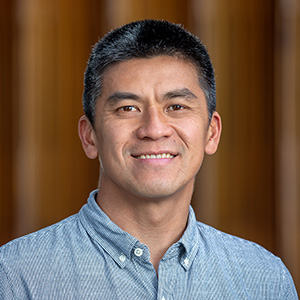Source: Interfolio F180

Howard Hang, PhD
Scripps Research Joint Appointments
Research Focus
My laboratory is broadly interested in the molecular mechanisms by which chemical signals modulate host microbe interactions in infection and immunity. These chemical signals (metabolites) may be derived from host metabolism (endogenous metabolites) or the environment (diet, microbiota, therapeutics) and have been challenging to mechanistically elucidate. To dissect the mechanisms that govern host-microbe interactions, my laboratory has 1) developed chemical methods to characterize metabolite-protein interactions and 2) employed key animal models to discover new protective factors from specific microbiota species and elucidated their mechanisms of action. These studies have revealed unpredicted metabolite-protein functions in host immunity and microbial pathogenesis as well as novel microbiota protective factors, which have afforded new therapeutic leads and biomarkers for infection, inflammation and immunotherapy.
Education
Ph.D. (Chemistry), University of California, Berkeley, 2003B.S. (Chemistry), University of California, Santa Cruz, 1998
Professional Experience
2004 - 2006 Postdoctoral fellow in Immunology and Microbial Pathogenesis with Prof. Hidde Ploegh, Harvard Medical School and Whitehead Institute of Biomedical Research
1998 - 2003 Ph.D. in Chemistry with Prof. Carolyn Bertozzi, Univ. of California, Berkeley
1994 - 1998 B.S. in Chemistry with Prof. Joseph Konopelski, Univ. of California, Santa Cruz
Awards & Professional Activities
1997-1998 Doug Drexler Chemistry Scholarship, University of California, Santa Cruz1998 Dean's and Chancellor's Award, University of California, Santa Cruz
1998 Priscilla Parkin Memorial Scholarship, University of California, Santa Cruz
1998 Kenneth and Ann Thiemann Scholarship, University of California, Santa Cruz
1999 Outstanding Graduate Student Instructor (CHEM 3B), University of California, Berkeley
2002 Organic Division Graduate Fellowship, American Chemical Society
2004 Damon Runyon Fellowship Award, Damon Runyon Cancer Research Foundation
2007 Irma T. Hirschl/Monique Weill-Caulier Trust Research Award, Weill Cornell Medicine
2008 New Scholar in Aging, Ellison Foundation
2011 Distinguished Teaching Award, The Rockefeller University
2017 Eli Lilly Award in Biological Chemistry, American Chemical Society Division of Biological Chemistry
2019 Synergy Award, Kenneth Rainin Foundation
Selected Publications
Luo, Ji-dung; Jha, Jyoti K.; Hang, Howard C.; Griffin, Matthew E.; Fanger, Gary R.; Espinosa, Juliel; Carroll, Thomas S.; Becker, Jessica L. Enterococcus peptidoglycan remodeling promotes checkpoint inhibitor cancer immunotherapy.. Science (New York, N.Y.) 2021, 1040-1046.
[View]
Rangan, Kavita J.; Pedicord, Virgini A.; Wang, Yen- C.; Kim, Byungchul; Lu, Yun; Shaham, Shai; Mucida, Daniel; Hang, Howard C. A secreted bacterial peptidoglycan hydrolase enhances tolerance to enteric pathogens. 2016, 353, 1434-1437.
Chen, Victor; Griffin, Matth E.; Maguin, Pascal; Varble, Andrew; Hang, Howard C. RecT Recombinase Expression Enables Efficient Gene Editing in spp. 2021, 87, e0084421.
[View]
Zhang, Zhenrun J.; Pedicord, Virgini A.; Peng, Tao; Hang, Howard C. Site-specific acylation of a bacterial virulence regulator attenuates infection. Nature Chemical Biology 2020, 16, 95-103.
[View]
Kim, Byungchul; Wang, Yen- C.; Hespen, Charles W.; Espinosa, Juliel; Salje, Jeanne; Rangan, Kavita J.; Oren, Deen A.; Kang, Jin Y.; Pedicord, Virgini A.; Hang, Howard C. Enterococcus faecium secreted antigen A generates muropeptides to enhance host immunity and limit bacterial pathogenesis. eLife 2019, 8.
[View]
Wang, Yen- C.; Westcott, Nathan P.; Griffin, Matth E.; Hang, Howard C. Peptidoglycan Metabolite Photoaffinity Reporters Reveal Direct Binding to Intracellular Pattern Recognition Receptors and Arf GTPases. ACS Chemical Biology 2019, 14, 405-414.
[View]
Spence, Jennifer S.; He, Ruina; Hoffmann, Hans-Heinrich H.; Das, Tandrila; Thinon, Emmanuelle; Rice, Charles M.; Peng, Tao; Chandran, Kartik; Hang, Howard C. IFITM3 directly engages and shuttles incoming virus particles to lysosomes. Nature Chemical Biology 2019, 15, 259-268.
[View]

